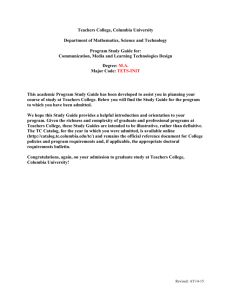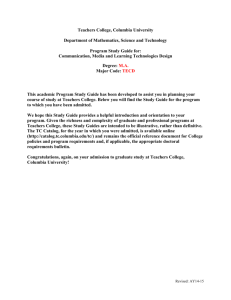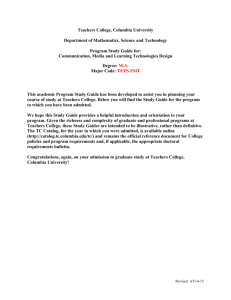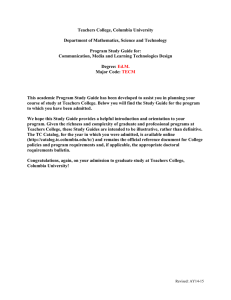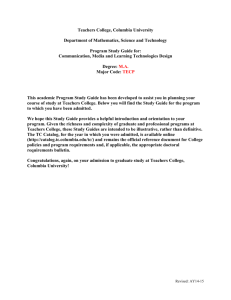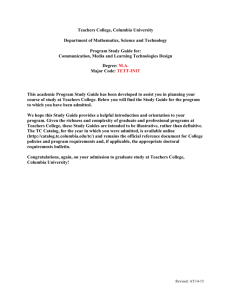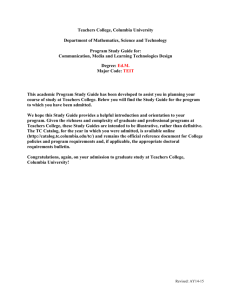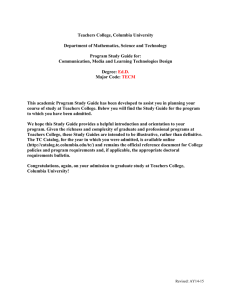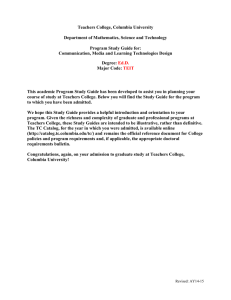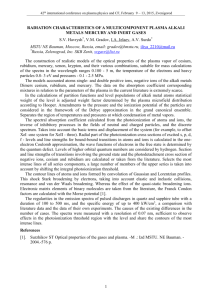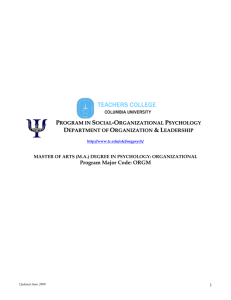Communication and Education - Teachers College Columbia
advertisement
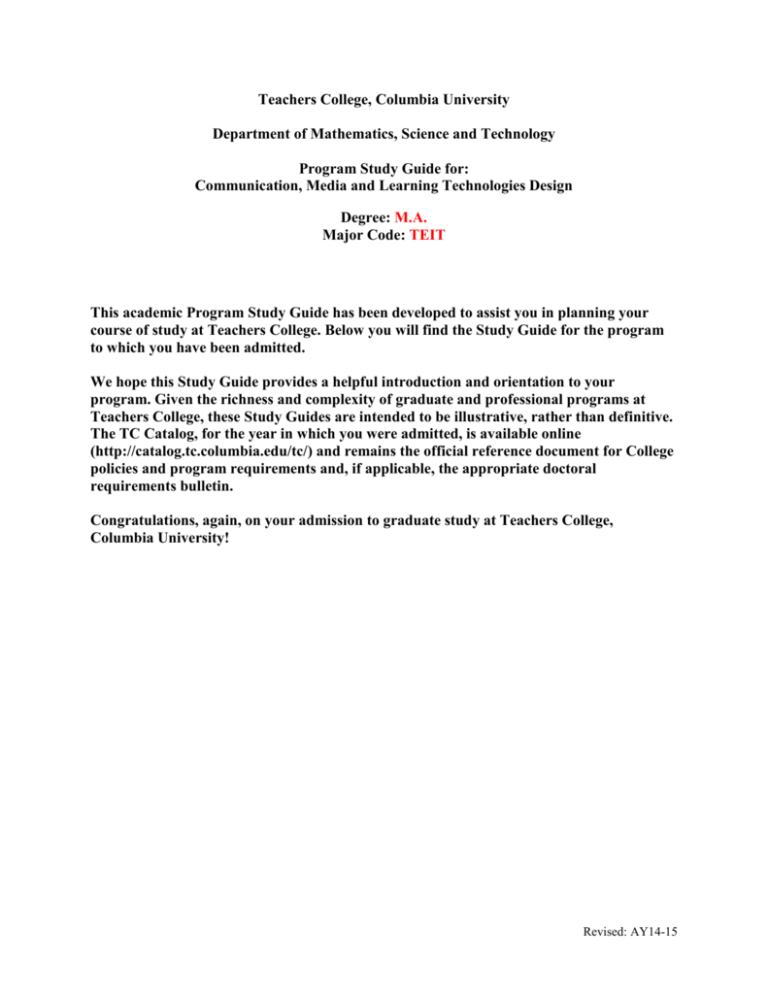
Teachers College, Columbia University Department of Mathematics, Science and Technology Program Study Guide for: Communication, Media and Learning Technologies Design Degree: M.A. Major Code: TEIT This academic Program Study Guide has been developed to assist you in planning your course of study at Teachers College. Below you will find the Study Guide for the program to which you have been admitted. We hope this Study Guide provides a helpful introduction and orientation to your program. Given the richness and complexity of graduate and professional programs at Teachers College, these Study Guides are intended to be illustrative, rather than definitive. The TC Catalog, for the year in which you were admitted, is available online (http://catalog.tc.columbia.edu/tc/) and remains the official reference document for College policies and program requirements and, if applicable, the appropriate doctoral requirements bulletin. Congratulations, again, on your admission to graduate study at Teachers College, Columbia University! Revised: AY14-15 2 TEACHERS COLLEGE COLUMBIA UNIVERSITY Department of Mathematics, Science and Technology COMMUNICATION, MEDIA AND LEARNING TECHNOLOGIES DESIGN PROGRAM Instructional Technology and Media Degree: Master of Arts (M.A.) Major Code: TEIT Brief Program Description In recent years, students in the program have made four questions paramount: Which emerging technologies hold greatest promise for enriching learning experiences throughout the educational enterprise? What pedagogical strategies should designers embody in instructional materials, including those based on multimedia and those reflected in gaming environments? How should educators deploy, manage, and evaluate information and communication technologies in classrooms for optimal educational effect? What principles of design and practice should educators incorporate into distributed educational courses and programs? Minimum Point Requirement A minimum of 32 points of coursework are required for completion of the degree. Course credits from previous, non-Teachers College work cannot be transferred in to count toward the 32 points required for the M.A. degree. . Required Courses (16 points, minimum) MSTU 4000: Core Seminar (1 point). One-point registration for MSTU 4000 is required during the first Fall semester in a student's program; registration (for 0 points) is also required in the Spring semester for M.A. students intending to graduate in May. MSTU 4031: Object-Oriented Theory and Programming I (3 points) or MSTU 5003: Theory and Programming: Interactive Media I (3 points) MSTU 5031: Object-Oriented Theory and Programming II (3 points) or MSTU 5013: Theory and Programming: Interactive Media II (3 points) MSTU 4083: Instructional Design of Educational Technology (3 points; counts toward the Educational Practice and Design area, below) One course from at least three of the following four areas must be completed. Courses must be chosen from those listed under the respective area (9 points). Cognitive and Learning Sciences Issues and Technology MSTU 4133: Cognition and Computers MSTU 4088: Introduction to Education Technology and Learning Sciences Social Issues and Technology MSTU 4020: Social and Communicative Aspects of ICTs MSTU 4005: Equity, Ethics and Social Issues Revised: AY14-15 3 Cultural Issues and Technology MSTU 4028: Technology and Culture MSTU 5002: Culture, Media and Education Educational Practice and Design MSTU 4001: Technology and School Change MSTU 4050: Online Schools and Online Schooling K-12 MSTU 4083: Instructional Design of Educational Technology Elective Courses (6 points, minimum) At least 6 points of additional MSTU courses. NOTE: No more than 3 points of "skills" courses may be counted toward the M.A., although students are encouraged to take additional skills courses that further their interests and goals. "Skills" courses include the following (this is a sample list): MSTU 4029: Managing Educational Technology Resources MSTU 5191: Educational Video Production I MSTU 5199: Database Driven Website Development; Director; 3-D Modeling; Flash Communication Server MSTU 5814: Adobe InDesign; Digital Video; GIS in Curriculum; Creating Dynamic Websites. Students who meet the Breadth Requirement (see below) by completing the minimum 6 points required in that category have 9 points of elective coursework. Students who meet the Breadth Requirement by completing more than the minimum requirement in that category have as few as 6 points of elective coursework. Breadth Requirement (6 points, minimum) All [M.A., Ed.D., etc.] students must complete a minimum of three courses, each for at least two credits, at Teachers College and outside the Communication, Media and Learning Technologies Design Program (that is, TC courses with a prefix other than MSTU). Statement about the Required, Integrative Project The Integrative M.A. Project can be either an individual project or part of a larger project involving several students. For students completing the M.A. degree, this project should be related to their career goals, and should provide tangible evidence of their skills and strengths. Project criteria and expectations will be outlined by students’ Masters Adviser. Transfer Credit Evaluation Course credits from previous, non-Teachers College work cannot be transferred in to count toward the 32 points required for the M.A. degree. Statement about Satisfactory Progress Students are expected to make satisfactory progress toward the completion of degree requirements. Where there are concerns about satisfactory progress, students will be informed by the program faculty and/or their respective M.A. adviser, and a suggested plan and timeline for remediation will be provided. If satisfactory progress is not maintained a Revised: AY14-15 4 student may be dismissed from the program. Please see the statement on policy of grades at Teachers College. URL: http://catalog.tc.columbia.edu/tc/catalogdetail/policiesproceduresdocuments/grades/ Other Information Dr. Yoo Kyung Chang is the adviser for students in CMLTD Masters degree programs and also guide work on the Integrative Project. Students can also work with other faculty in the program in addition to their respective master’s advisor as they move through completion of program requirements. Standard Policies and Procedures Services for Students with Disabilities: The College will make reasonable accommodations for persons with documented disabilities. Students are encouraged to contact the Office of Access and Services for Individuals with Disabilities for information about registration (163 Thorndike Hall; 212-678-3689; TTY: 212-678-3853). Services are available only to students who are registered and submit appropriate documentation. Statement on Academic Conduct: A Teachers College student is expected to refrain from any conduct, including cheating, plagiarizing, or purchasing documents submitted for academic evaluation, that calls into question his/her academic and/or professional probity. Decisions regarding academic evaluation in all aspects of students’ work at the college, including course work, certification examinations, clinical or field experiences, and preparation of dissertations, are within the sole jurisdiction of the faculty concerned, including as appropriate, the department or program staff members. Disciplinary actions (e.g., reprimand, suspension, or dismissal) in cases of academic misconduct can be imposed by the Vice Provost or the Committee on Student Conduct. Resolution of Student Academic Program Concerns: Any student who has a concern regarding an academic matter may seek assistance. The procedure for resolving academic program concerns (see note of grade correction process below) begins with either the faculty member (if the concern is related to a course) or the student’s advisor. If the student is not satisfied with the response or resolution achieved at this first level, or if speaking with the faculty member presents a conflict of interest for the student, the student should proceed to speak with the Program Coordinator in the area in which the academic concern resides. If the student is not satisfied with the response or resolution achieved through the Program Coordinator, the student should proceed to speak with the Chair of the academic department in which the academic concern resides. If the student is still not satisfied with the response or resolution achieved through the Department Chair, or if speaking with the Department Chair presents a conflict of interest for the student, the next step is to contact the Office of the Vice Provost. At any stage of the process, students are welcome to seek the advice and guidance of the Ombudsman, who is charged with attempting to informally resolve student dissatisfaction of an academic nature on a completely confidential basis. Grade Correction Procedure: The instructor for a course has the responsibility for setting the requirements for a course and making an evaluation of students’ work. Once a grade has been given, the instructor is not free to change the grade unless the instructor indicates to the Revised: AY14-15 5 Registrar that an error was made in the original grade transmitted. If a student believes that an error has been made, he/she must take the initiative in bringing about the necessary correction prior to the conclusion of the semester immediately following the semester in which the course was taken. The normal procedure for effecting a correction would be through direct discussion between the student and the instructor. If redress cannot be attained through such discussions, the student may next appeal to the department chairperson of the department offering the course. If resolution cannot be attained through appeal, the student may next appeal to the Dean. In situations where the student feels that such an appeal process might not be in the student’s interest, counsel and assistance can be sought from the Office of the College Ombudsman and the Office of the Vice Provost. (Continued on next page) Revised: AY14-15 6 Instructional Technology and Media (M.A.; Program Code: TEIT; Minimum Points: 32) The following grid provides a way to conceptualize your progress through the program. Place the semester and year you anticipate enrolling in a course under "Enrollment Date." Place the semester and year in which you completed a course under "Date Completed." Enrollment Date Date Completed Required Courses (16 points, minimum) MSTU 4000: Core Seminar (1 point). One-point registration during the first Fall semester in a student's program. MSTU 4000: Core Seminar (0 point). Zero-point registration in the Spring semester for M.A. students intending to graduate in May. MSTU 4031: Object-Oriented Theory and Programming I (3 points) or MSTU 5003: Theory and Programming: Interactive Media I (3 points) MSTU 5031: Object-Oriented Theory and Programming II (3 points) or MSTU 5013: Theory and Programming: Interactive Media II (3 points) MSTU 4083: Inst. Design of Educational Technology (3 points; counts toward the Educational Practice and Design area, below) One course from three of the following four areas. Courses must be chosen from those listed under the respective area (9 points). Cognitive and Learning Sciences Issues and Technology o MSTU 4133: Cognition and Computers o MSTU 4088: Introduction to Educational Technology and Learning Sciences Social Issues and Technology o MSTU 4020: Social and Communicative Aspects of ICTs o MSTU 4005: Equity, Ethics and Social Issues Cultural Issues and Technology o MSTU 4028: Technology and Culture o MSTU 5002: Culture, Media and Education Educational Practice and Design o MSTU 4001: Technology and School Change o MSTU 4050: Online Schools and Online Schooling K-12 o MSTU 4083: Inst. Design of Educational Technology Revised: AY14-15 7 Elective Courses (6 points, minimum) At least nine points of additional MSTU courses. NOTE: No more than 3 points of "skills" courses may be counted toward the M.A. List your elective courses below. Breadth Requirement (6 points, minimum) All [M.A., Ed.D., etc.] students must complete a minimum of three courses, each for at least two credits, at Teachers College and outside the Communication, Media and Learning Technologies Design Program (that is, TC courses with a prefix other than MSTU). List your breadth requirement courses below. Integrative Project List completion date: To further help your planning, the following grid shows when courses are typically offered. However, while every effort is made to offer courses as shown below, unexpected developments can result in changes. You should check with your advisor and with the current schedule of classes during the registration period to confirm a given course's availability. Please note that the following is a guide only, and not a definitive statement confirming that a class will be offered as shown. Unless otherwise noted, courses are offered f2f.1 Course Number and Name MSTU 4000: Core Seminar MSTU 4001: Technology and School Change MSTU 4005: Equity, Ethics and Social Issues MSTU 4016: History of Communication 1 Fall Semester Yes Spring Semester Yes (for May graduates only) Yes Yes, online only Yes Yes Face-to-face, in a classroom setting, as opposed to online. Revised: AY14-15 8 Course Number and Name MSTU 4020: Social and Communicative Aspects of ICTs MSTU 4031: Object-Oriented Theory and Programming I or MSTU 5003: Theory and Programming: Interactive Media I MSTU 4050: Online Schools and Online Schooling K-12 MSTU 4083: Instructional Design of Educational Technology MSTU 4133: Cognition and Computers MSTU 4088: Introduction to Educational Technology and Learning Sciences MSTU 5031: Object-Oriented Theory and Programming II or MSTU 5013: Theory and Programming: Interactive Media II MSTU 4028: Technology and Culture MSTU 5002: Culture, Media and Education MSTU 5607: Readings in Communication Theory and Social Thought II Fall Semester Yes Spring Semester Yes Yes Yes, online only Yes, f2f and online Yes, online only Yes , f2f and online Yes, online only Yes Yes Yes Yes Yes, online only Yes Revised: AY14-15
